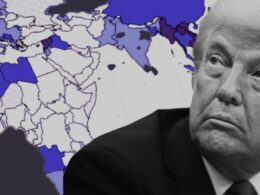Stay informed with free updates
Simply sign up to the Airlines myFT Digest — delivered directly to your inbox.
Two of Europe’s largest airlines have warned that some Europeans are starting to avoid US travel, as President Donald Trump’s policies risk hitting some of the world’s busiest flight paths.
Air France-KLM and Lufthansa have this week reported signs of weakening demand on transatlantic routes among European passengers, although they said the impact had been limited.
“We know there are a lot of customers that are holding back in buying tickets for a little more clarity on . . . the border, and things like that,” Air France-KLM chief executive Ben Smith told analysts on Wednesday, as the airline reported quarterly results.
Its chief financial officer Steven Zaat said there had been a shift in booking patterns as demand from American travellers flying to Europe grew, while some Europeans turned away from US trips.
Transatlantic bookings from Europeans for travel in May and June were down 2.4 per cent compared with the previous year. Travel in the other direction, driven by high spending American tourists, was up 2.1 per cent.
Signs of travellers avoiding the US amid economic tensions and fears of a hostile border pose a threat to the major European long-haul airline groups, which are heavily reliant on their lucrative transatlantic routes.
Analysts at Barclays have estimated that US services generate at least 50 per cent of profits for the three major European “flag carriers”: Lufthansa, British Airways owner IAG and Air France-KLM.
Carsten Spohr, Lufthansa’s chief executive, also said on Tuesday that some European passengers were showing hesitance in booking transatlantic trips. The German airline reported a “slight weakening” in bookings for the busy summer season, particularly for US travel.
“When it comes to vacation trips to the US, especially from the German, Austrian and Swiss markets, it’s easy to imagine conversations around the kitchen table where families are saying, ‘We don’t know yet if we really want to go,’” he said.
Spohr said the airline group would slightly cut its planned growth in transatlantic flying in the fourth quarter, from 6 per cent year on year to 3 per cent, but that he hoped demand would rebound.
“The discussions about tariffs are no longer as heated as they were four weeks ago. That is why we believe that some of these bookings will be recovered in the coming weeks,” he added.
Lufthansa said it had set up a “task force” to “respond quickly and flexibly to any weakening in demand”, including by cutting flight schedules.
Shares in Lufthansa, IAG and Air France-KLM have been under pressure this year, amid investor concern over the impact on those routes and the broader threat of an economic slowdown weighing on demand for flying. The Financial Times this month reported that the total number of overseas visitors travelling to the US dropped 12 per cent in March, year on year.
Several other travel companies have also warned of signs of a hit to demand on the transatlantic routes. Virgin Atlantic has noted a slowdown in demand from travellers in the US, while Sébastien Bazin, the chief executive of French hotel giant Accor, told Bloomberg there was a “bad buzz” around visiting the US.
However, both Air France-KLM and Lufthansa were upbeat on the broader prospects for travel this summer, sticking to their full-year forecasts even as they warned of uncertainty driven by geopolitics.
“Despite all the geopolitical uncertainties, we . . . remain on course for growth, are optimistic about the summer, and are sticking to our positive outlook for 2025,” Spohr said.
Air France-KLM reported a lower first-quarter loss on Wednesday. The airline group reported an operating loss of €328mn in the first quarter of the year, down from €489mn a year earlier.
Revenue rose 7.7 per cent to €7.2bn, driven by strong demand for its business and first class cabins.
Data visualisation by Alan Smith
Source link









